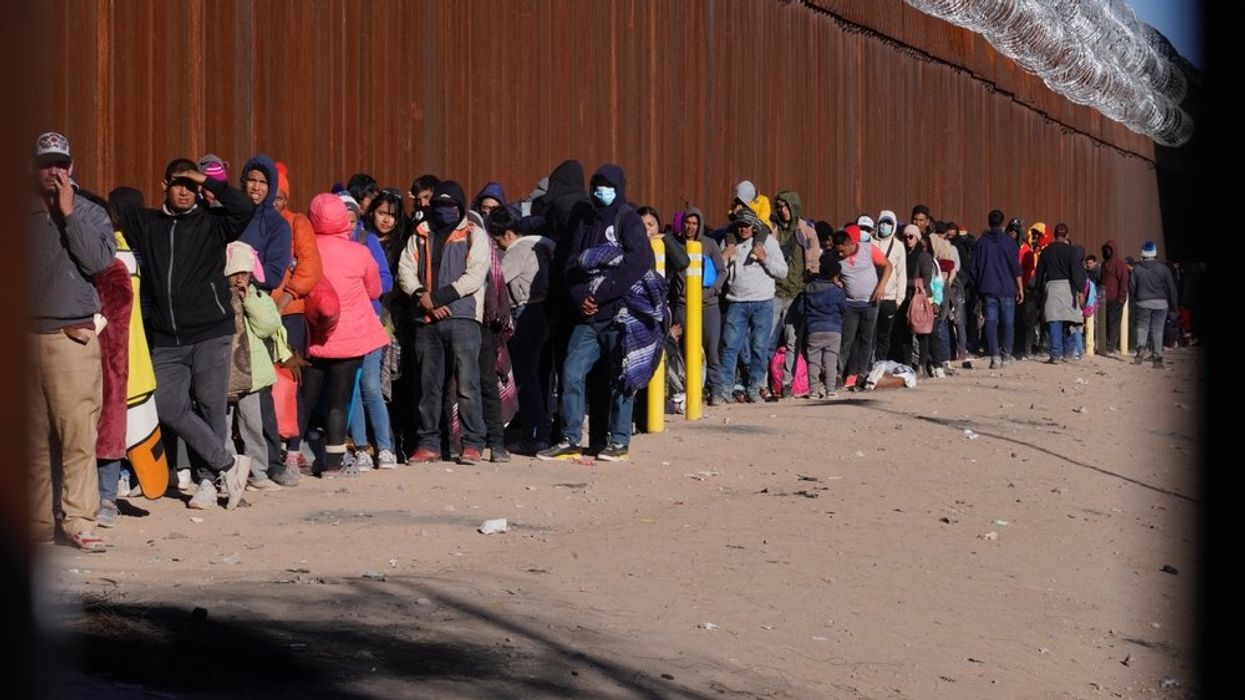Editor's note: John Avlon is a CNN senior political analyst and anchor. He is the author of “Lincoln and the Fight for Peace.” The views expressed in this commentary are his own. View more opinion at CNN.
(CNN) — Do House Republicans really want to solve the border crisis? Not if they bow to Donald Trump’s latest demands.
This seems cynical even by current Bizarro world standards. Because if you constantly tell people that America is suffering an “invasion” that will require mass deportations on day one, you’d think there’d be real urgency to solve the problem right now.
That urgency is reflected in the actions of the US Senate, where conservative Oklahoma Sen. James Lankford has been working diligently with Democrats like Senate Majority Leader Chuck Schumer of New York to come up with a border security bill that can muster 60 votes in the center. After a White House meeting, there was renewed optimism that a deal can get done with a vote soon, coupling border security with much-needed aid to Ukraine, which is fighting a literal border invasion from Russia.
But then the House of Representatives needs to take up the bill — and that’s where Speaker Mike Johnson is facing more threats from his far-right flank, who have been signaling that they will balk at any border security bill until a Republican is president.
Right-wing resistance is entirely consistent with a Trump-ified GOP that is more willing to demagogue an issue than actually deal with it. In an interview with Fox News Wednesday night, Johnson confirmed he’s also been getting pressure from Trump to reject the bipartisan Senate deal. Apparently, the art of the deal only applies if Trump gets credit. The MAGA crew would rather fear-monger and fundraise off an alleged invasion at the Southern border then stop it — because they’re afraid President Joe Biden or Democrats might get some credit for helping to stem the tide of migrants trying to cross our border.
Even the most generous explanation — that they don’t believe that a Democratic president will implement the tough measures they believe are necessary — doesn’t hold water if they really believe that this is the most urgent issue facing our nation. If a Republican is elected next year, they can presumably deal with those deficiencies. But refusing to support a bill that could help solve the problem with concrete measures negotiated by conservative colleagues in the Senate shows a fundamental lack of faith in deliberative democracy. Compromise is not the same thing as surrender.
This is one of many issues where Speaker Johnson is on a collision course with Republican Senate Minority Leader Mitch McConnell. Democrats have already made significant concessions to conservative priorities to get this bill down the field. Before the New Year’s break, Schumer said, “I think [Republicans] realize that Democrats have moved much more to the middle on border security.”
To be clear, this is not the comprehensive immigration reform grand bargain that most Democrats would like to see and that President Biden has called for. It is a narrow bill dealing with border security. Given the overflow of migrants and asylum seekers at the Southern border now bleeding into cities like New York, it is pragmatic to reform enforcement of asylum laws and expedite those claims while strengthening border security. Perfect is never on the menu, especially when you’re approaching politics from an all-or-nothing perspective.
As Scott Jennings, a CNN analyst and longtime advisor to McConnell, told me via text: “Republican voters have been clamoring for something — anything — to stop what they believe is an invasion. I just don’t understand how you can bring a Democratic president to his knees on the topic and then walk away from the win? Take the win!”
This message was reinforced by South Carolina Sen. Lindsey Graham, who advised his recalcitrant colleagues, “If you think you’re going to get a better deal next time, in ’25, if President Trump’s president, Democrats will be expecting a pathway to citizenship for that … So to my Republican colleagues, this is a historic moment to reform the border.”
The sense of historic and moral urgency should only increase when you consider that the Biden administration has called for connecting border security with funding for Ukraine in its effort to repel Russia’s actual invasion. In the not-so-distant past, this — like support for Israel in its war against Hamas after the horrific terror attacks of October 7 — would have received broad bipartisan support. It is a matter of America standing up for freedom, self-determination and civilization against unprovoked acts of war.
But the line between democracies and dictatorships seems blurry for some folks these days. The tough-guy posture of populists folds fast in the face of Russian President Vladimir Putin, as Trump reflexively praises the dictator even after the invasion. Largely as a result, support for Ukraine has become a divisive issue on the right — which means it’s conservatives who are reluctant to stand up to Russian aggression, in a complete reversal of Reagan-era principles.
On Wednesday afternoon, I spoke to a soldier who’d volunteered to help defend Ukraine, who was at the US Capitol making the case to lawmakers. Mark is a British-born US citizen from Texas who served three tours in Ukraine with an international brigade. “This is a classic good versus evil — there’s no ambiguity,” he told me. “This war will go in whatever direction the US and American politicians decide. If they’re too busy infighting between political parties and playing games, Ukrainians will lose and ultimately, we — in the West — will lose.”
Karla Webber’s son Andrew was killed volunteering in Ukraine. He was a West Point educated Army officer who graduated from law school after serving in Iraq and Afghanistan. She shared with me a text Andrew sent explaining why he felt compelled to return to a combat zone, despite having a wife and two kids at home: “I view the invasion of Ukraine as the most dangerous threat to freedom and democracy abroad. I believe that for the United States to abandon the people of Ukraine at this stage, when they have experienced so much hardship and suffering in the name of freedom from fear, is nothing less than an abandonment of the cherished ideals I’ve spent a lifetime—at home and abroad—supporting and defending in war and peace.”
Andrew, she told me, believed that “people in leadership positions need to do the right thing and usually that’s the hard thing.” That’s the message members of Congress need to hear — and act on — as the clock ticks on Capitol Hill.
The-CNN-Wire
™ & © 2024 Cable News Network, Inc., a Warner Bros. Discovery Company. All rights reserved.
Trump and immigration

Video Source: Advocate Channel
- US-Mexico Border Is the World’s Deadliest Land Route For Migrants ›
- High-Speed Chases at the Southern Border Are Increasingly Killing Immigrants ›
- A Migrant Crossed the Border and Found a 9-Year-Old Boy Alone in the Desert. The Encounter Changed Them Both ›
- Biden's Strict Border Policies Threaten to Damage His 2024 Campaign ›


















































